Order your Rocal homeopathic granules on Soin-et-Nature.com and benefit from a wide choice of strains formulated according to traditional pharmaceutical methods, such as centesimal, decimal or Korsakovian dilutions. Developed by the French laboratory Rocal-Lehning, these high-quality homeopathic medicines meet everyday natural health needs with effectiveness, safety and ease of use.
More details
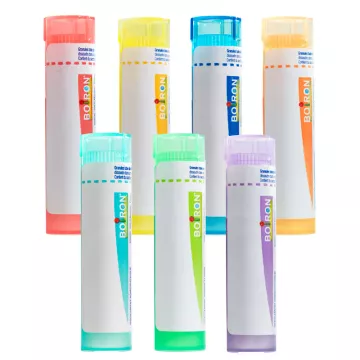
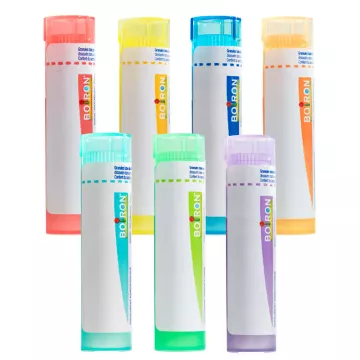
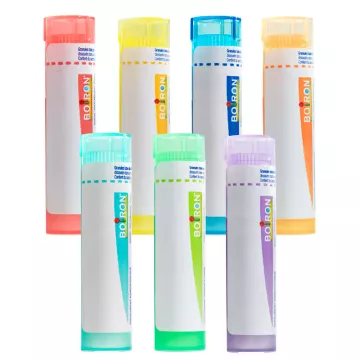
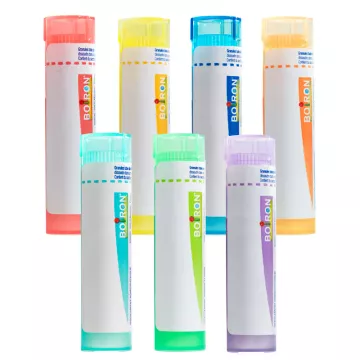
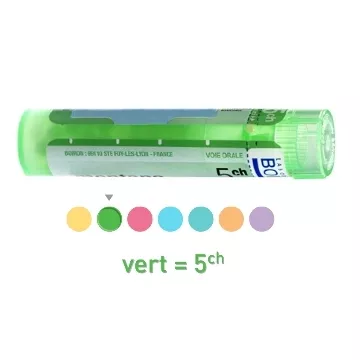

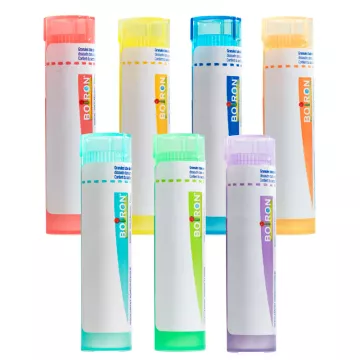

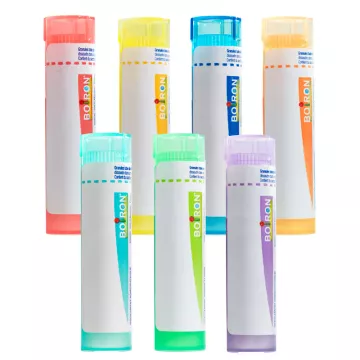
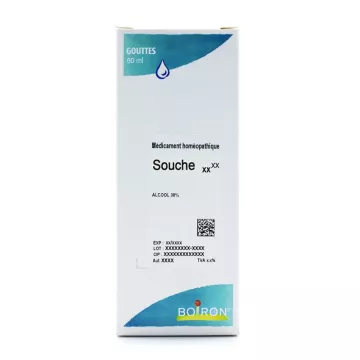
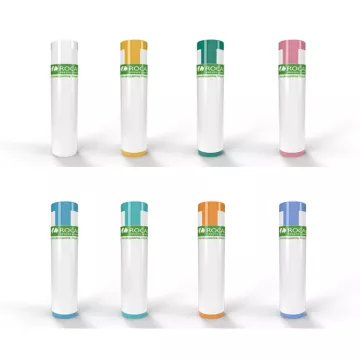
Discover the full range of homeopathic granules from French laboratory Rocal Lehning in our online pharmacy .
Lehning, a German physician, laid the foundations of homeopathy in 1796. Homeopathic practice has been officially recognized in France by the CNOM since 1997. A large number of doctors have adopted this alternative medicine, and the French even more so, since just over half the country's inhabitants use Rocal Lehning homeopathy.
Soin-et-Nature.com offers you a wide choice of Lehning Rocal homeopathic granules and doses to combat many everyday symptoms (diarrhoea, pain, etc.).
There are many homeopathic granules formulated by the Rocal laboratory (Lehning group) which are widely used by homeopaths. These homeopathic strains are called"Formules de Prescription Courante" or FPC. Here are a few examples of popular CPFs with the main indications for which they are used:
| Name of CPF | Indications |
|---|---|
| Arnica 9CH | Trauma, joint and muscle pain, bruising |
| Nux vomica 9CH | Stomach pain, constipation, nausea, migraines |
| Rhus toxicodendron 9CH | joint pain, stiffness and arthritis-related pain |
| Bryonia 9CH | chest pain, cough, fever, headache |
| Belladonna 9CH | Fever, headache, sore throat, joint pain |
| Pulsatilla 9CH | Menstrual pain, ovulation disorders, ear pain, colds and coughs |
It's important to note that these FPCs should not be used as a replacement for medical treatment for a specific illness, and it's best to consult a doctor before using them, especially in cases of chronic or serious illness.
There are many different CPEs available on the market, and this list is not exhaustive. It is important to remember that homeopathy cannot be used as a replacement for appropriate medical treatment for a specific condition. It is best to consult a physician or healthcare professional before deciding to use homeopathic medicines to treat an illness or condition.
The Rocal homeopathic laboratories are located in Paris. They manufacture and market non-proprietary homeopathic specialties, based on strains prepared by the laboratories. Over 1000 strains are available, from the best-known to the rarest.
Dilution dynamization is the method used to prepare homeopathic remedies. First, the strain is diluted in a volume of liquid, usually pharmaceutical alcohol, several times, depending on the desired homeopathic dilution. Between each dilution, the resulting mixture must be shaken a hundred times; this is called succussion, and its purpose is to perfect the dilution. The combination of dilution and succussion is known as dynamization.
Pharmaceutical laboratories use several preparation methods. Here are the steps involved in making a Rocal Lehning homeopathic remedy from a plant strain:
For substances that are insoluble in water, we use the principle of mixing in lactose, until we obtain a mixture that is soluble in a mixture of water and alcohol.
The distinction between Hahnemanian centesimal (CH) and Hahnemanian decimal (DH) is essential for very low dynamizations.
From a therapeutic point of view, above the 7th dynamization, CH is considered equivalent to DH.
We invite you to use our quick order page to easily place all your Rocal homeopathic granules in your virtual basket.
Homeopathy, an alternative medical practice, is attracting growing interest worldwide. Understanding the labels on homeopathic tubes is essential to using these medicines safely and effectively. This article guides you through the important details of a homeopathic label, using Arnica Montana 9CH as an example.
In our example, "Arnica Montana" represents the homeopathic strain. This Latin term refers to the fundamental raw material of the medicine. The use of Latin in the nomenclature of homeopathic strains ensures precise, universal identification. This eliminates ambiguities linked to the common names of ingredients in different languages and cultures.
One of the fundamental principles of homeopathy is dilution. Preparing a homeopathic remedy involves diluting the base substance as well as dynamizing it, a process unique to this form of medicine. In the example of Arnica Montana 9CH, the "9 CH" indicates that the strain has undergone nine successive dilutions, each dilution being to the hundredth. In other words, one drop of the raw material is mixed with 99 drops of a hydroalcoholic solution, and this process is repeated nine times.
The letters "C.H" on the labels of homeopathic medicines refer to the "Hahnemannian Centesimal". This dilution method, developed by Dr. Samuel Hahnemann, the founder of homeopathy, is one of the methods used to prepare homeopathic remedies. It is distinguished by its specific process of dilution and dynamization, which is supposed to increase the effectiveness of the remedy.
Dilution is a key element in the preparation of homeopathic medicines. It is based on the principle that the more a substance is diluted, the more effective it is. This notion, although controversial in conventional medicine, is the cornerstone of homeopathy. Dilution aims to eliminate toxicity while preserving the curative properties of the base substance.
Homeopathy is based on two fundamental principles: "similia similibus curentur" or "like cures like", and the principle of dilution. The first principle suggests that a substance that causes symptoms in a healthy person can, when diluted, treat similar symptoms in a sick person. This unique approach sets homeopathy apart from other forms of medicine.